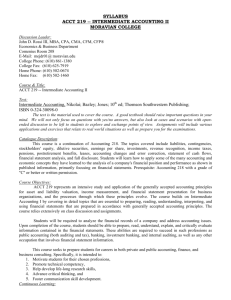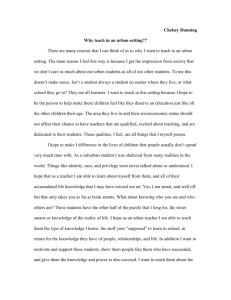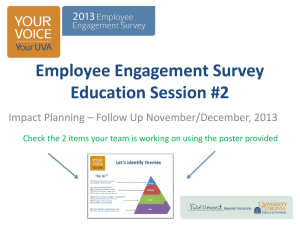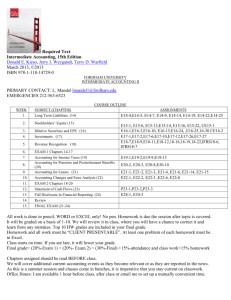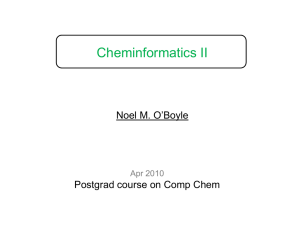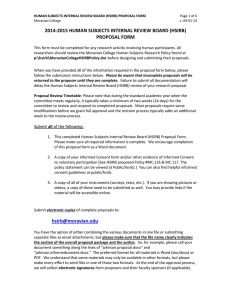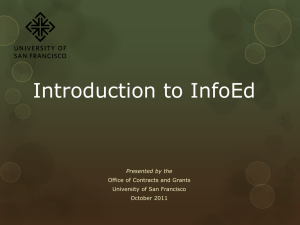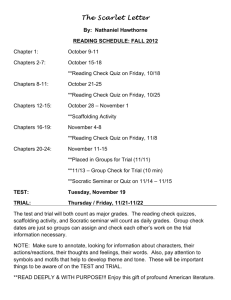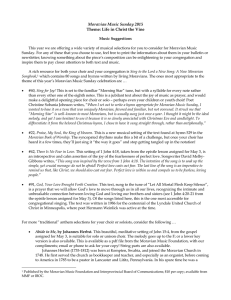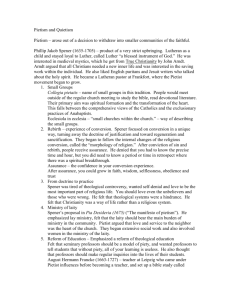SYLLABUS ACCT 219 -- INTERMEDIATE ACCOUNTING II
advertisement
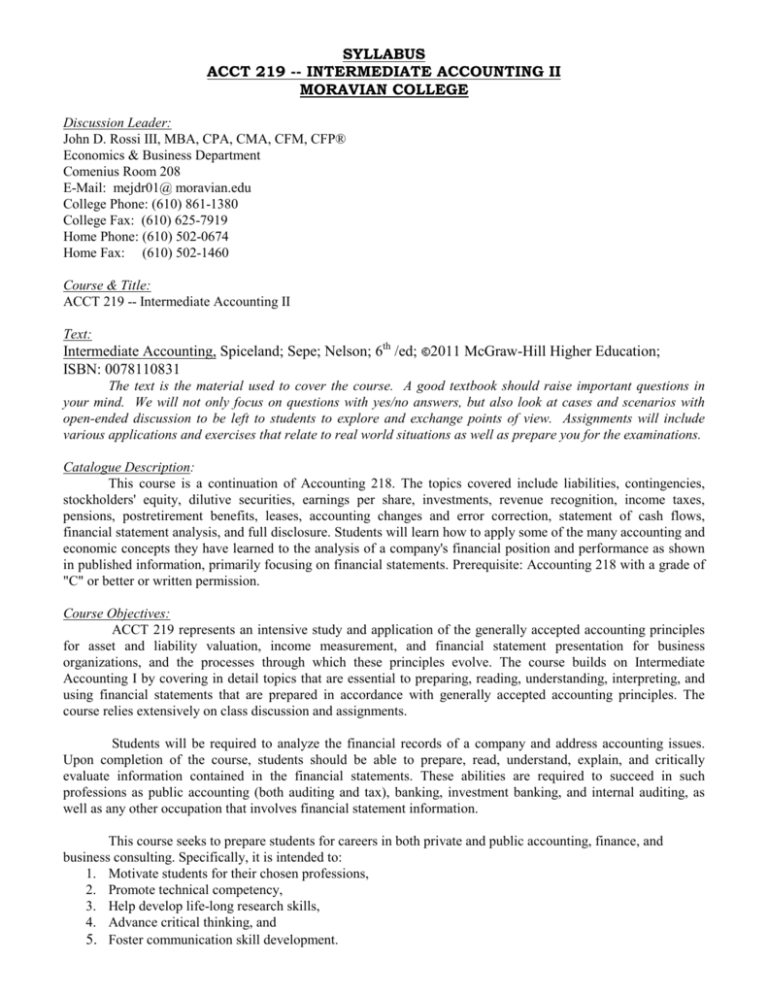
SYLLABUS ACCT 219 -- INTERMEDIATE ACCOUNTING II MORAVIAN COLLEGE Discussion Leader: John D. Rossi III, MBA, CPA, CMA, CFM, CFP® Economics & Business Department Comenius Room 208 E-Mail: mejdr01@ moravian.edu College Phone: (610) 861-1380 College Fax: (610) 625-7919 Home Phone: (610) 502-0674 Home Fax: (610) 502-1460 Course & Title: ACCT 219 -- Intermediate Accounting II Text: Intermediate Accounting, Spiceland; Sepe; Nelson; 6th /ed; 2011 McGraw-Hill Higher Education; ISBN: 0078110831 The text is the material used to cover the course. A good textbook should raise important questions in your mind. We will not only focus on questions with yes/no answers, but also look at cases and scenarios with open-ended discussion to be left to students to explore and exchange points of view. Assignments will include various applications and exercises that relate to real world situations as well as prepare you for the examinations. Catalogue Description: This course is a continuation of Accounting 218. The topics covered include liabilities, contingencies, stockholders' equity, dilutive securities, earnings per share, investments, revenue recognition, income taxes, pensions, postretirement benefits, leases, accounting changes and error correction, statement of cash flows, financial statement analysis, and full disclosure. Students will learn how to apply some of the many accounting and economic concepts they have learned to the analysis of a company's financial position and performance as shown in published information, primarily focusing on financial statements. Prerequisite: Accounting 218 with a grade of "C" or better or written permission. Course Objectives: ACCT 219 represents an intensive study and application of the generally accepted accounting principles for asset and liability valuation, income measurement, and financial statement presentation for business organizations, and the processes through which these principles evolve. The course builds on Intermediate Accounting I by covering in detail topics that are essential to preparing, reading, understanding, interpreting, and using financial statements that are prepared in accordance with generally accepted accounting principles. The course relies extensively on class discussion and assignments. Students will be required to analyze the financial records of a company and address accounting issues. Upon completion of the course, students should be able to prepare, read, understand, explain, and critically evaluate information contained in the financial statements. These abilities are required to succeed in such professions as public accounting (both auditing and tax), banking, investment banking, and internal auditing, as well as any other occupation that involves financial statement information. This course seeks to prepare students for careers in both private and public accounting, finance, and business consulting. Specifically, it is intended to: 1. Motivate students for their chosen professions, 2. Promote technical competency, 3. Help develop life-long research skills, 4. Advance critical thinking, and 5. Foster communication skill development. Continuous Learning: My approach to teaching is based on the need for continuous learning as an essential for success in any profession. One major trend that is happening as a result of advances in technology is that skills necessary for success change. In the agricultural economy physical strength and endurance was king; in the industrial age, grit and sweat was important; and in the post-industrial era, the demand was for smarts. Smarts is the ability to learn allot of information over a period of time and then at some future point be able to give it back. Smarts is the ability to pass a test with an A on stuff you just learned. Unfortunately, most students think that it will take them places when they graduate – HOW WRONG THEY ARE! The world is moving into a new economy in which nobody is going to pay for smarts, because smarts is what is going into software programs. What companies will pay for is intelligence. Intelligence is the ability to figure things out when you never learned them before. Intelligence is the ability to get from A to D when there is no B or C. It requires a different thought process than smarts. Intelligence will shake out the people who will be successful in accounting over the next 10 years, and those with just smarts will find their opportunities diminishing. Those who are intelligent will find the demand for them increasing because there is so much complexity in the world that business demands intelligence. Course Philosophy: Accounting programs and courses should not be teaching students to be accountants at the time they graduate, but rather, students should be taught how to think and learn. This statement was developed by the Accounting Education Change Commission (AECC), which was formed to help implement changes in the way accounting courses are taught throughout the United States. This philosophy provides a base upon which continuous learning is built. It allows Moravian College to provide you with the finest accounting program available anywhere. The basis for continuous learning, upon which my teaching methods are driven, has three components: skills, knowledge, and professional orientation. 1. Skill: To become professionals, graduates must possess communication skills, intellectual skills, and interpersonal skills. 2. Knowledge: Graduates should have general knowledge, organizational and business knowledge, and accounting knowledge. You will acquire these through the sequence of courses you take for your major combined with the Moravian College Guidelines for Liberal Education or LINC requirements. 3. Professional Orientation: Students must be able to identify with their profession and develop the knowledge, skills and values of its members. They should know and understand the ethics of the profession and be able to make value-bases judgments. Awareness of various business and accounting related professions are included in the course discussion. The study of ethics and related cases are also incorporated into accounting and business courses; many of these require students to make value-based judgments. To meet the objectives discussed previously, you need to develop the skills and strategies to become more intelligent. You also need to know how to use these strategies as part of the process of continuous learning. This generally means you should not expect me to stand at the board and lecture class after class while you take notes and memorize them later. You are not learning how to learn by doing this. Continuous learning is best accomplished by having the need for knowledge and knowing how to acquire it. You will find that you remember more with little or no memorization under these circumstances. You must also be active participants in the learning process. Learning by doing will be emphasized. Working in-groups will be encouraged. Teaching methods that expand and reinforce communication, intellectual, and interpersonal skills will be used. Class Participation: Successful completion of this class will require extensive class participation. Class members are required to read all of the assigned exercises/problems/cases/requirements and to prepare the material as requested. I will adjust the final grade upward based on the nature of each student's involvement. Higher participation grades will be given for insightful comments or questions that relate to class material, minimal grades will be assigned for simple questions of clarification, and deductions will be distributed for students attempting to confuse, delay, or embarrass the discussion leader. 2 Study Commitment: This course requires uninterrupted exposure and study. Therefore, it is important that you attend each class and complete, or at least attempt, all assigned work. As a general guideline, you can expect to spend three to four hours outside class for each class hour. A major reason for failure in this course has been "getting behind." The pace of this and all other accounting courses is extremely fast and some of you may feel uncomfortable. Each concept builds on prior concepts. Don't be fooled into believing you can begin exams or projects the day or night before and expect to pass. Method of Teaching: I use the "Socratic” method of classroom questioning to teach accounting and act as a discussion leader. In preparing the course syllabus, I designed this course in a sequential manner to keep the discussion moving from one element of the topic to the next one until the completion of each subject. It is my responsibility to be sure that the needed material is covered properly. I will expand the subject under discussion and hopefully trigger your interest. I will allow time for you to raise questions, exchange thoughts and ideas and help you in exploring nontraditional insights and unexpected interpretations, answer questions by raising questions rather than providing direct answers, moderate the discussion; so as to stick to the subject matter and encourage you to discuss topics with each other as well as myself. Students are considered participants in the continuous learning process. All students are expected to participate by being prepared for class. You should listen actively, take notes and respect each other’s opinion. Please, do not stay confused but raise and ask questions for clarification. Questions are the vocal attention of the Socratic art of effective learning. The core of critical thinking is the ability to use Socratic questioning techniques. Questions should help in raising inquiry that evolves on the spot rather than being predetermined by me. Questions are used to develop interest in the topic and are used to steer students towards desired responses. In general, questions should lead students to go back to the text to evaluate, define, clarify and speculate answers to raised inquiries. Academic Honesty: Integrity and honesty are qualities considered to be the "norm" among students at Moravian. However, any student who chooses to deviate from that "norm" risks automatic failure in this course. Method of Evaluation: Grades are a measure of knowledge not a process of obtaining knowledge. My objective is to treat all students fairly. The examinations and projects are intended to measure your command of the subject matter. Therefore, they are rigorous but not designed to have "tricks" or "traps." Grades will be based upon five examinations including a take-home portion, class participation, leadership and professional activities will provide upward grade adjustment points. Participation in Accounting Club activities will earn you up to 3 additional bonus points. All students are expected to take tests when scheduled and submit assignments when due. Makeup tests and extensions must be cleared by the instructor in advance and will only be granted with a legitimate excuse. OVERALL COURSE GRADE: A+ A AB+ B BC+ C CD F 96 to 100 93 to 95.9 89 to 92.9 87 to 88.9 83 to 86.9 79 to 82.9 76 to 78.9 72 to 75.9 68 to 71.9 58 to 67.9 BELOW 58 3 Intermediate Accounting II - (ACCT 219) Class Schedule Date January 18 January 20 January 25 January 27 February 1 February 3 February 8 February 10 February 15 February 17 February 22 February 24 March 1 March 3 March 8 March 10 March 15 March 17 March 22 March 24 March 29 March 31 April 5 April 7 April 12 April 14 April 19 April 21 April 26 April 28 TBA Topic Welcome & Introduction PP&E Utilization and Impairment PP&E Utilization and Impairment Investments Investments Current Liabilities & Contingencies Current Liabilities & Contingencies Bonds and Long-Term Notes Exam Chapters 11 & 12 Bonds and Long-Term Notes Leases Leases Income Taxes Exam Chapters 13 & 14 No Class – Spring Break No Class – Spring Break Income Taxes Pensions & Postretirement Benefits Pensions & Postretirement Benefits Shareholders’ Equity Shareholders’ Equity Exam Chapters 15, 16 & 17 Share-Based Compensation Share-Based Compensation Accounting Change & Error Correction Accounting Change & Error Correction Exam Chapters 18 & 19 Statement of Cash Flows Statement of Cash Flows Statement of Cash Flows Exam Chapters 20 & 21 Chapter Chapter 11 Chapter 11 Chapter 12 Chapter 12 Chapter 13 Chapter 13 Chapter 14 Chapter 14 Chapter 15 Chapter 15 Chapter 16 Chapter 16 Chapter 17 Chapter 17 Chapter 18 Chapter 18 Chapter 19 Chapter 19 Chapter 20 Chapter 20 Chapter 21 Chapter 21 Chapter 21 This schedule is preliminary and the exact dates assigned to each topic may vary depending on the pace of the class discussion. 4 MORAVIAN COLLEGE ACCT 219 INTERMEDIATE ACCOUNTING II STUDENT SURVEY NAME: _____________________________________________________________________ EMPLOYER: _________________________________________________________________ OCCUPATION: _______________________________________________________________ HOW CAN YOU CAN BE REACHED? CAMPUS: __________________; HOME: _______________; CELL: ____________________ E-MAIL (S): __________________________________________________________________ WILLINGNESS TO BE AN ACTIVE MEMBER OF THE ACCOUNTING CLUB: _____________ ____________________________________________________________________________ ____________________________________________________________________________ ____________________________________________________________________________ EMPLOYMENT EXPERIENCE AS IT RELATES TO THIS COURSE: ____________________ ____________________________________________________________________________ ____________________________________________________________________________ ____________________________________________________________________________ EXPECTATIONS OF THE COURSE: _____________________________________________ ____________________________________________________________________________ ____________________________________________________________________________ ____________________________________________________________________________ ANY SPECIAL INTEREST OR AREAS YOU WOULD LIKE ME TO EMPHASIZE: ___________ ____________________________________________________________________________ ____________________________________________________________________________ ____________________________________________________________________________ PREFERENCE IN TEACHING METHODS AND STYLES: _____________________________ ____________________________________________________________________________ ____________________________________________________________________________ ____________________________________________________________________________ COMMENTS:_________________________________________________________________ ____________________________________________________________________________ ____________________________________________________________________________ 5
